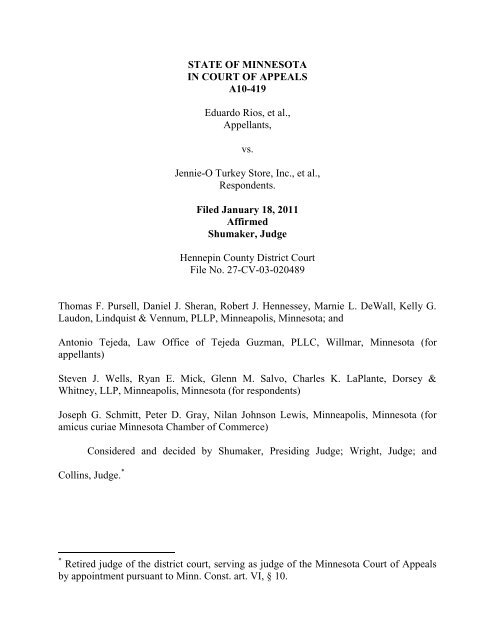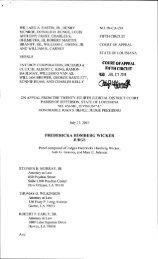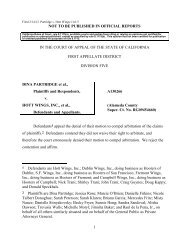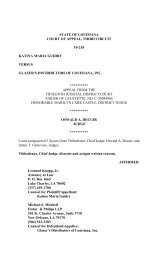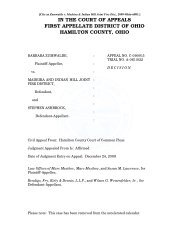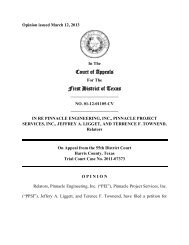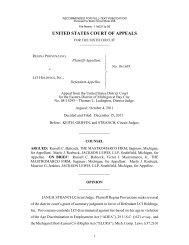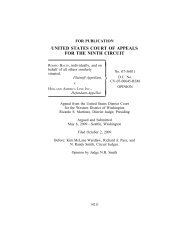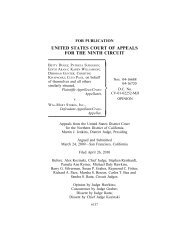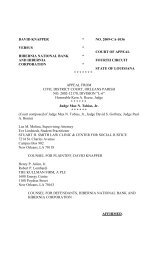STATE OF MINNESOTA IN COURT OF APPEALS A10 ... - LawMemo
STATE OF MINNESOTA IN COURT OF APPEALS A10 ... - LawMemo
STATE OF MINNESOTA IN COURT OF APPEALS A10 ... - LawMemo
Create successful ePaper yourself
Turn your PDF publications into a flip-book with our unique Google optimized e-Paper software.
<strong>STATE</strong> <strong>OF</strong> <strong>M<strong>IN</strong>NESOTA</strong><br />
<strong>IN</strong> <strong>COURT</strong> <strong>OF</strong> <strong>APPEALS</strong><br />
<strong>A10</strong>-419<br />
Eduardo Rios, et al.,<br />
Appellants,<br />
vs.<br />
Jennie-O Turkey Store, Inc., et al.,<br />
Respondents.<br />
Filed January 18, 2011<br />
Affirmed<br />
Shumaker, Judge<br />
Hennepin County District Court<br />
File No. 27-CV-03-020489<br />
Thomas F. Pursell, Daniel J. Sheran, Robert J. Hennessey, Marnie L. DeWall, Kelly G.<br />
Laudon, Lindquist & Vennum, PLLP, Minneapolis, Minnesota; and<br />
Antonio Tejeda, Law Office of Tejeda Guzman, PLLC, Willmar, Minnesota (for<br />
appellants)<br />
Steven J. Wells, Ryan E. Mick, Glenn M. Salvo, Charles K. LaPlante, Dorsey &<br />
Whitney, LLP, Minneapolis, Minnesota (for respondents)<br />
Joseph G. Schmitt, Peter D. Gray, Nilan Johnson Lewis, Minneapolis, Minnesota (for<br />
amicus curiae Minnesota Chamber of Commerce)<br />
Considered and decided by Shumaker, Presiding Judge; Wright, Judge; and<br />
Collins, Judge. *<br />
* Retired judge of the district court, serving as judge of the Minnesota Court of Appeals<br />
by appointment pursuant to Minn. Const. art. VI, § 10.
S Y L L A B U S<br />
A claim for unpaid overtime compensation under the Minnesota Fair Labor<br />
Standards Act fails as a matter of law if the amount of compensation received by a<br />
plaintiff for a workweek exceeds the amount required to be paid under the act for that<br />
workweek.<br />
SHUMAKER, Judge<br />
O P I N I O N<br />
This is an appeal from summary judgment dismissing claims asserted by a<br />
certified class under the Minnesota Fair Labor Standards Act (MFLSA) and the common<br />
law of contracts. Because there are no genuine issues of material fact and judgment was<br />
appropriate as a matter of law, we affirm.<br />
FACTS<br />
The broad question presented to us is whether the district court erred in concluding<br />
that certain employees have been paid for all tasks they performed for their employers<br />
under their employment contract and consistent with the MFLSA. Because this appeal is<br />
taken from the district court‟s award of summary judgment to the employers, we note that<br />
the dispositive facts, summarized briefly below for context, are not in dispute. In their<br />
brief, appellants concede that they “agree with virtually all of the factual findings” from<br />
various court orders but that they “believe the lower court erred on the law.” Other<br />
allegedly disputed matters noted below do not raise genuine issues of material fact<br />
because they are unsupported by the evidence.<br />
2
Respondent Jennie-O Turkey Store, Inc. operates six turkey-processing plants in<br />
Minnesota. Appellants are current or former production-line employees of Jennie-O who<br />
receive hourly wages for regular work hours and for overtime.<br />
To meet sanitation and safety standards, Jennie-O requires appellants to wear<br />
certain gear and equipment, such as boots, pants, smocks, gloves, and hats. Before they<br />
start their shifts, appellants must “don,” that is, put on, the necessary gear and equipment,<br />
and they “doff,” or remove, it at the completion of their shifts. They also partially don<br />
and doff these items for meal breaks. There is no dispute that donning and doffing are<br />
conditions of their employment.<br />
Jennie-O has used two different methods to record the times of the start and the<br />
end of shifts. Prior to 2007, there was either a pre-set start time, or a supervisor would<br />
“swipe” a time card to start and end a shift. The shift ended with individual time-card<br />
swipes. From and after 2007, the start and conclusion of a shift was determined by<br />
individual time-card swipes. Appellants contend that neither timekeeping method fully<br />
captures the time required for mandated donning and doffing, and that these timekeeping<br />
deficits have resulted in the underpayment of their wages in violation of their contracts<br />
and the MFLSA.<br />
Viewing the facts in a light most favorable to appellants, the district court ruled<br />
that, although they were not paid for some of their donning and doffing time, that time<br />
never exceeded eight hours per employee during a week and thus did not violate the<br />
MFLSA 48-hour workweek rule. The court said: “Even though [appellants] were not<br />
paid for every minute spent donning and doffing, they were paid according to the law for<br />
3
overtime compensation.” Furthermore, the court held that there was no breach of<br />
contract because compensation for donning and doffing was not a part of the employment<br />
agreements.<br />
Contending that the district court erred in its interpretation and application of<br />
controlling law and in its ruling on the contract claim, appellants brought this appeal.<br />
ISSUES<br />
I. Did the district court err by dismissing appellants‟ claims under the<br />
MFLSA?<br />
II. Did the district court err by dismissing appellants‟ contract-based claims?<br />
III. Did the district court err by ordering final judgment, thereby precluding<br />
appellants from pursuing a recordkeeping claim?<br />
ANALYSIS<br />
We review de novo a district court‟s grant of summary judgment. STAR Ctrs., Inc.<br />
v. Faegre & Benson, L.L.P., 644 N.W.2d 72, 77 (Minn. 2002). Summary judgment is<br />
appropriately granted when there are no genuine issues of material fact and judgment is<br />
appropriate as a matter of law. Minn. R. Civ. P. 56.03. “We view the evidence in the<br />
light most favorable to the party against whom summary judgment was granted.” STAR<br />
Ctrs., 644 N.W.2d at 76-77. “[T]o avoid summary judgment, the nonmoving party must<br />
present evidence that is „sufficiently probative with respect to an essential element of the<br />
nonmoving party‟s case to permit reasonable persons to draw different conclusions.‟”<br />
Presbrey v. James, 781 N.W.2d 13, 16 (Minn. App. 2010) (quoting DLH, Inc. v. Russ,<br />
566 N.W.2d 60, 71 (Minn. 1997)).<br />
4
I.<br />
Appellants challenge the dismissal of their claims that Jennie-O violated the<br />
MFLSA by (A) failing to pay overtime compensation for hours worked in excess of 48<br />
hours per week, particularly for time spent donning and doffing required gear, and<br />
(B) failing to provide a full 30-minute meal break during each eight hours of work.<br />
Appellants argue that the district court misinterpreted the relevant provisions of the<br />
MFLSA in granting summary judgment on these claims.<br />
“The aim in statutory interpretation is to give effect to the intention of the<br />
legislature in drafting the statute.” Milner v. Farmers Ins. Exchange, 748 N.W.2d 608,<br />
613 (Minn. 2008). If the language of a statute is clear and unambiguous, we apply its<br />
plain meaning. Brua v. Minn. Joint Underwriting Ass’n, 778 N.W.2d 294, 301 (Minn.<br />
2010). If statutory language is ambiguous, “we apply other canons of construction to<br />
discern the legislature‟s intent.” Id. at 300 (citing Minn. Stat. § 645.16 (2010)). We<br />
review de novo the district court‟s interpretation of a statute. Milner, 748 N.W.2d at 613.<br />
A.<br />
Under the MFLSA, an employee is entitled to compensation at a rate equal to one-<br />
and-one-half times his regular rate of pay (overtime compensation), for time worked in<br />
excess of 48 hours per workweek. Minn. Stat. § 177.25, subd. 1 (2010), (prohibiting<br />
workweeks longer than 48 hours “unless the employee receives compensation for<br />
employment in excess of 48 hours in a workweek at a rate of at least 1-1/2 times the<br />
regular rate at which the employee is employed”). In this manner, the MFLSA is less<br />
restrictive than its federal counterpart, the Fair Labor Standards Act (FLSA), which<br />
5
equires overtime compensation for time worked in excess of 40 hours per workweek. 29<br />
U.S.C. § 207(a)(1) (2006). The rules implementing the MFLSA designate the<br />
“workweek” as “[t]he period of time used for determining compliance with” the overtime<br />
requirements of the MFLSA. Minn. R. 5200.0170, subp. 1 (2009). The “workweek” in<br />
turn is defined as “a fixed and regularly recurring period of 168 hours, seven consecutive<br />
24-hour periods,” presumptively the calendar week. Id.<br />
The district court granted summary judgment dismissing appellants‟ statutory<br />
overtime claim because appellants could not demonstrate that their compensation fell<br />
below the amount required by the MFLSA. The district court determined that appellants‟<br />
compensation—which included overtime compensation for (undisputed) hours worked in<br />
excess of 40 as required by the FLSA—so significantly exceeded the compensation<br />
required under the MFLSA that, even when the disputed donning and doffing time was<br />
included in the calculation, the appellants‟ compensation exceeded that required by the<br />
MFLSA. The district court properly viewed the facts in the light most favorable to<br />
appellants in reaching this determination.<br />
Appellants assert that the district court erred by employing a “workweek<br />
averaging” rule in relation to their overtime claim. Although the district court‟s<br />
determination of Jennie-O‟s overtime compliance relied upon the construct of a<br />
workweek—as is directed by rule 5200.0170—and referred to workweek averaging, the<br />
court did not actually engage in any “averaging.” Rather, the district court compared the<br />
amount of compensation that appellants actually received with the amount to which they<br />
6
were entitled under the MFLSA, and, because the former was greater than the latter,<br />
determined that their overtime claim failed as a matter of law.<br />
Appellants also suggest that the district court‟s analysis improperly creates an<br />
“FLSA offset” for determining damages under the MFLSA. To the contrary, appellants<br />
are attempting to import the requirements of the FLSA into the determination of whether<br />
there has been a violation of the MFLSA. As we noted above, the FLSA is the more<br />
restrictive statute, requiring overtime compensation for all time worked in excess of 40<br />
hours per week. Thus, employees who work more than 40 hours in a workweek, but<br />
fewer than 48 hours, may have a claim under the FLSA but not under the MFLSA.<br />
Nothing in the MFLSA compels or allows courts to take into account compensation paid<br />
or due under the FLSA in determining whether there has been a violation of the MFLSA.<br />
The district court did not err by granting summary judgment on appellants‟<br />
statutory overtime claim. The district court properly analyzed appellants‟ statutory<br />
overtime claim by comparing the amount due under the MFLSA to the amounts actually<br />
received by appellants. And because appellants cannot demonstrate that they were paid<br />
less than the MFLSA required, the district court properly dismissed the statutory<br />
overtime claim.<br />
B.<br />
With respect to meal breaks, the MFLSA provides: “An employer must permit<br />
each employee who is working for eight or more consecutive hours sufficient time to eat<br />
a meal.” Minn. Stat. § 177.254, subd. 1 (2010). The statute does not, however,<br />
“require[] the employer to pay the employee during the meal break.” Id., subd. 2 (2010).<br />
7
Under the Minnesota Rules, an employer must pay an employee for meal periods that are<br />
not bona fide:<br />
Bona fide meal periods are not hours worked. Bona fide meal<br />
periods do not include rest periods such as coffee breaks or<br />
time for snacks. The employee must be completely relieved<br />
from duty for the purpose of eating regular meals. Thirty<br />
minutes or more is ordinarily long enough for a bona fide<br />
meal period. A shorter period may be adequate under special<br />
conditions.<br />
Minn. R. 5200.0120, subp. 4 (2009). Read together, these provisions (1) require an<br />
employer to give a meal break of sufficient length to eat a meal during each eight-hour<br />
shift, and (2) allow employers to deduct from hours worked only meal breaks that are<br />
bona fide, which generally means that employees are completely relieved from work for<br />
at least 30 minutes.<br />
The district court dismissed appellants‟ statutory meal-break claim, reasoning that<br />
there is no bright-line requirement for a 30-minute meal under Minnesota law.<br />
Appellants argue that the district court missed the point, asserting that the issue is not<br />
whether the 30-minute break is required but whether a break of shorter length is<br />
deductible. Appellants, however, neither pleaded this theory nor did they argue it to the<br />
district court on summary judgment. And we generally do not consider issues not<br />
presented to and decided by the district court. Thiele v. Stich, 425 N.W.2d 580, 582<br />
(Minn. 1988). We further note that, to the extent that appellants alleged unpaid donning<br />
and doffing time before and after breaks, this unpaid time was included in the analysis of<br />
appellants‟ statutory overtime claim. Accordingly, we conclude that the district court did<br />
not err by dismissing appellants‟ statutory meal-break claim.<br />
8
II.<br />
Appellants challenge the dismissal of their claims that respondents breached their<br />
oral employment agreements by failing to pay overtime compensation for hours worked<br />
in excess of 40 hours per week, particularly for time spent donning and doffing required<br />
gear, and failing to provide a 30-minute meal break and two 15-minute rest breaks<br />
during each eight hours of work. Each of appellants‟ contract claims rests on their<br />
assertion that respondents agreed to pay them for time spent donning and doffing.<br />
The district court rejected appellants‟ contract-based claims, determining that<br />
respondents contracted with appellants for employment, but that compensation for<br />
donning and doffing was not a term of that contract and that there was no subsequent,<br />
unilateral offer to compensate for donning and doffing. Both the existence and terms of<br />
an oral contract are issues of fact, generally to be decided by the fact-finder. Cherne<br />
Contracting Corp. v. Marathon Petroleum Co., 578 F.3d 735, 740 (8th Cir. 2009); see<br />
also Roske v. Ilykanyics, 232 Minn. 383, 393-94, 45 N.W.2d 769, 776 (1951) (assigning<br />
error in district court‟s determination of terms of oral contract). Notwithstanding,<br />
disputes over the existence or terms of oral agreements do not necessarily preclude<br />
summary judgment. Cherne, 578 F.3d at 740. “Rather, as with the analysis for summary<br />
judgment in any case, where no reasonable jury could find the facts necessary to entitle a<br />
plaintiff to relief, summary judgment remains appropriate.” Id.<br />
Minnesota courts apply an objective standard of contract formation. Riley Bros.<br />
Constr., Inc. v. Shuck, 704 N.W.2d 197, 202 (Minn. App. 2005) (“Minnesota follows the<br />
objective theory of contract formation, under which the parties‟ outward manifestations<br />
9
are determinative, rather than either party's subjective intent.”). Here, the record is<br />
devoid of any evidence that Jennie-O offered to pay appellants for time spent donning<br />
and doffing. 1 To the contrary, appellants have either conceded that they never discussed<br />
with respondents whether they could be paid for donning and doffing or admitted that<br />
they cannot recall any such discussions. Appellants attempt to rely on provisions in<br />
employee handbooks as reflecting an agreement to pay for donning and doffing, but fail<br />
to cite any language identifying such a promise. 2 Appellants assert that the dearth of<br />
evidence demonstrates the existence of a genuine issue of material fact to be decided by<br />
the jury. But we conclude that, on this record, no reasonable jury could find that the<br />
parties reached an agreement that appellants would be paid for donning and doffing.<br />
Appellants assert that such a conclusion leaves undefined a term of the contract<br />
necessary to its operation, i.e., the “work” to be compensated. In so arguing, appellants<br />
rely on § 204 of the Restatement (2d) of Contracts, which allows the court to supply a<br />
missing, necessary term that is “reasonable in the circumstances.” The Second<br />
1 Appellants assert that the district court erred by placing on them the burden of<br />
proving the terms of their oral employment agreements, relying on Minn. Stat. § 181.56<br />
(2010) for the proposition that the employer has the burden to prove employment terms.<br />
We agree with respondents that section 181.56 must be read in connection with Minn.<br />
Stat. § 181.55 (2010), which requires written notice of certain employment terms not at<br />
issue here. Moreover, appellants indisputably do have the burden to “present specific<br />
facts showing that there is a genuine issue for trial.” Minn. R. Civ. P. 56.05.<br />
2 The handbooks include disclaimers likely sufficient to preclude contract<br />
formation. See, e.g., Audette v. Northeast State Bank of Mpls., 436 N.W.2d 125, 127<br />
(Minn. App. 1989) (affirming summary-judgment dismissal of handbook-based contract<br />
claim because disclaimer language negated intent to form contract). But appellants<br />
purportedly rely on the handbook provisions as reflecting the terms of an earlier oral<br />
agreement, as opposed to creating contractual obligations in and of themselves.<br />
10
Restatement also recognizes, however, that “[p]art performance under an agreement may<br />
remove uncertainty and establish that a contract enforceable as a bargain has been<br />
formed.” Restat. (2d) of Contracts § 34(2); see also id. § 22(2) (providing that “[a]<br />
manifestation of mutual assent may be made even though neither offer nor acceptance<br />
can be identified and even though the moment of formation cannot be determined”).<br />
Applying these principles, we conclude that the allegedly undefined term became certain<br />
when appellants commenced work and when Jennie-O‟s payroll policies and practices<br />
were applied to determine their compensation.<br />
Appellants also attempt to incorporate into their oral employment agreements the<br />
MFLSA definition of “hours worked” and the FLSA requirement for overtime<br />
compensation for hours worked in excess of 40 per workweek, citing the principle that<br />
“parties to a contract are presumed to enter into their engagements with reference to the<br />
applicable law.” Indianhead Truck Line, Inc. v. Hvidsten Transp. Inc., 128 N.W.2d 334,<br />
341 (Minn. 1964); see also 11 Samuel Williston et al., A Treatise on the Law of<br />
Contracts § 30:19, at 203-04 (4th ed. 1999). (“Except where a contrary intention is<br />
evident, the parties to a contract . . . are presumed or deemed to have contracted with<br />
reference to existing principles of law.”).<br />
explained:<br />
This rule of incorporation, however, is not without limitation. As one court has<br />
It is true that parties . . . are presumed to contract with<br />
reference to existing law. But reference to such law is<br />
generally effected in cases of contract “construction,” i.e.,<br />
determination of the unexpressed implications of what is<br />
written, rather than in instances of “interpretation” of the<br />
11
written language. [State statutory law] is not a silent factor in<br />
every contract executed in this State in the sense that the<br />
statutory definitions . . . govern the interpretation of every<br />
ambiguous phrase in a private agreement. With respect to the<br />
process of interpreting contractual language, statutes and<br />
common law principles are only part of the surrounding<br />
circumstances, and should be so considered.<br />
Deerhurst Estates v. Meadow Homes, Inc., 165 A.2d 543, 552-53 (N.J. Ct. App. 1960).<br />
The Minnesota cases that appellants cite are consistent with this understanding. See<br />
Indianhead, 128 N.W.2d at 341 (considering appellate rules in determining whether an<br />
order was a “final order” within the meaning of the parties‟ contract); Larkin v. Glens<br />
Falls Ins. Co., 80 Minn. 527, 531-32, 83 N.W. 409, 410-11 (1900) (considering<br />
ordinance prohibiting repair of fire-damaged building in determining whether building<br />
was a “total loss” within the meaning of an insurance contract).<br />
Appellants invite this court to refer to the FLSA and MFLSA, not to aid in the<br />
interpretation or construction of established written contract terms, but to imply terms<br />
into an oral employment agreement. Finding no support for this extension of the caselaw,<br />
we decline to do so.<br />
Because there is no evidence to support appellants‟ assertion of an agreement to<br />
pay for time spent donning and doffing required gear, we conclude that the district court<br />
did not err by granting summary judgment dismissing appellants‟ contract-based claims.<br />
III.<br />
Appellants assert that the district court, having dismissed all pleaded counts of<br />
liability, erred by ordering a final judgment because the allegations in the complaint<br />
support a claim for recordkeeping violations of the MFLSA. Appellants concede that the<br />
12
claim was not asserted as a count in the complaint, and that they never sought to amend<br />
the complaint to add that count. Moreover, appellants did not argue—and thus the<br />
district court did not address—the recordkeeping claim in connection with the summary-<br />
judgment motion preceding the entry of final judgment. 3 Accordingly, the issue has been<br />
waived, and we decline to reach it. See Funchess v. Cecil Newman Corp., 632 N.W.2d<br />
666, 673 (Minn. 2001) (“In deciding a matter before it, a reviewing court generally may<br />
consider only those issues that the record shows were presented to and considered by the<br />
trial court.”); Hollywood Dairy, Inc. v. Timmer, 411 N.W.2d 258, 260 (Minn. App. 1987)<br />
(declining to consider whether complaint could be construed to encompass claim because<br />
“[t]hat argument was neither briefed nor argued to the trial court”).<br />
Even were the issue not waived, we would reject the argument that the<br />
recordkeeping claim was within the scope of the pleadings, such that appellants should<br />
have been permitted to pursue the claim. The Minnesota Supreme Court has held that,<br />
“in the furtherance of justice, pleadings are to be liberally construed,” Milner, 748<br />
N.W.2d at 618 (quotation omitted), and that “[t]he primary function of notice pleading is<br />
to give the adverse party fair notice of the theory on which the claim for relief is based,”<br />
Goeb v. Tharaldson, 615 N.W.2d 800, 818 (Minn. 2000). Consistent with this purpose,<br />
3 In an earlier motion for summary judgment, the parties briefed and the district<br />
court heard argument regarding whether, should the motion be granted, final judgment<br />
would be appropriate, or whether there was a surviving recordkeeping claim. Because<br />
the court denied that motion, it did not need to address the existence or viability of the<br />
recordkeeping claim. When respondents again moved for summary judgment, the motion<br />
was heard by a different judge, and appellants did not renew their argument regarding the<br />
recordkeeping claim.<br />
13
parties are allowed to amend pleadings freely “when justice so requires.” Minn. R. Civ.<br />
P. 15.01. Notwithstanding, a party that “fails to take advantage of this procedure . . . is<br />
bound by the pleadings unless the other issues are litigated by consent.” Roberge v.<br />
Cambridge Co-op Creamery Co., 243 Minn. 230, 234, 67 N.W.2d 400, 403 (1954).<br />
Appellants‟ initial complaint makes a single reference to the recordkeeping<br />
requirements of the MFLSA in the class-action allegations, identifying as a common<br />
issue “[w]hether Defendant accurately recorded and retained accurate records of<br />
Plaintiffs‟ compensable work and that of the Class as required by Minnesota Statute<br />
§ 177.30.” Appellants‟ later assertion of a punitive-damages claim includes additional<br />
references, citing the statute in the caption of the claim and alleging, in three paragraphs,<br />
Jennie-O‟s intentional disregard for the probability of injury from the failure to record all<br />
hours worked “so as to comply with the requirements of Minnesota law that proper and<br />
accurate records be kept of all such hours worked.” We conclude that these limited<br />
references, particularly in light of the otherwise explicit nature of the counts pleaded in<br />
the complaint, were not sufficient to put Jennie-O on notice of a recordkeeping claim.<br />
Appellants assert that Milner is on point and dictates reversal for further<br />
proceedings on the recordkeeping claims. In Milner, the district court found<br />
recordkeeping violations and imposed civil penalties despite the plaintiff‟s failure to<br />
plead a recordkeeping claim in the complaint. 748 N.W.2d at 618-19. However, in<br />
Milner there was a trial, and the supreme court, in concluding that the penalties were<br />
properly imposed, relied in part on the fact that evidence regarding recordkeeping<br />
14
violations was introduced at trial. Id. at 619. Accordingly, Milner is distinguishable and<br />
does not control the result here.<br />
Because we conclude that the district court did not err by granting summary<br />
judgment in favor of Jennie-O, we need not reach appellants‟ argument that the district<br />
court erred by ordering the return of certain documents inadvertently produced by<br />
respondents. Nor do we reach Jennie-O‟s challenges, by notice of related appeal, to the<br />
district court‟s orders granting class certification, allowing an amendment to assert a<br />
claim for punitive damages, and declining to strike certain of appellants‟ expert opinions.<br />
D E C I S I O N<br />
Because there are no genuine issues of material fact and the district court properly<br />
determined that appellants‟ MFLSA and contract-based claims fail as a matter of law, and<br />
because we reject, as both waived and unavailing, appellants‟ argument that they should<br />
be allowed to pursue a recordkeeping claim, we affirm judgment in favor of Jennie-O.<br />
Affirmed.<br />
15


